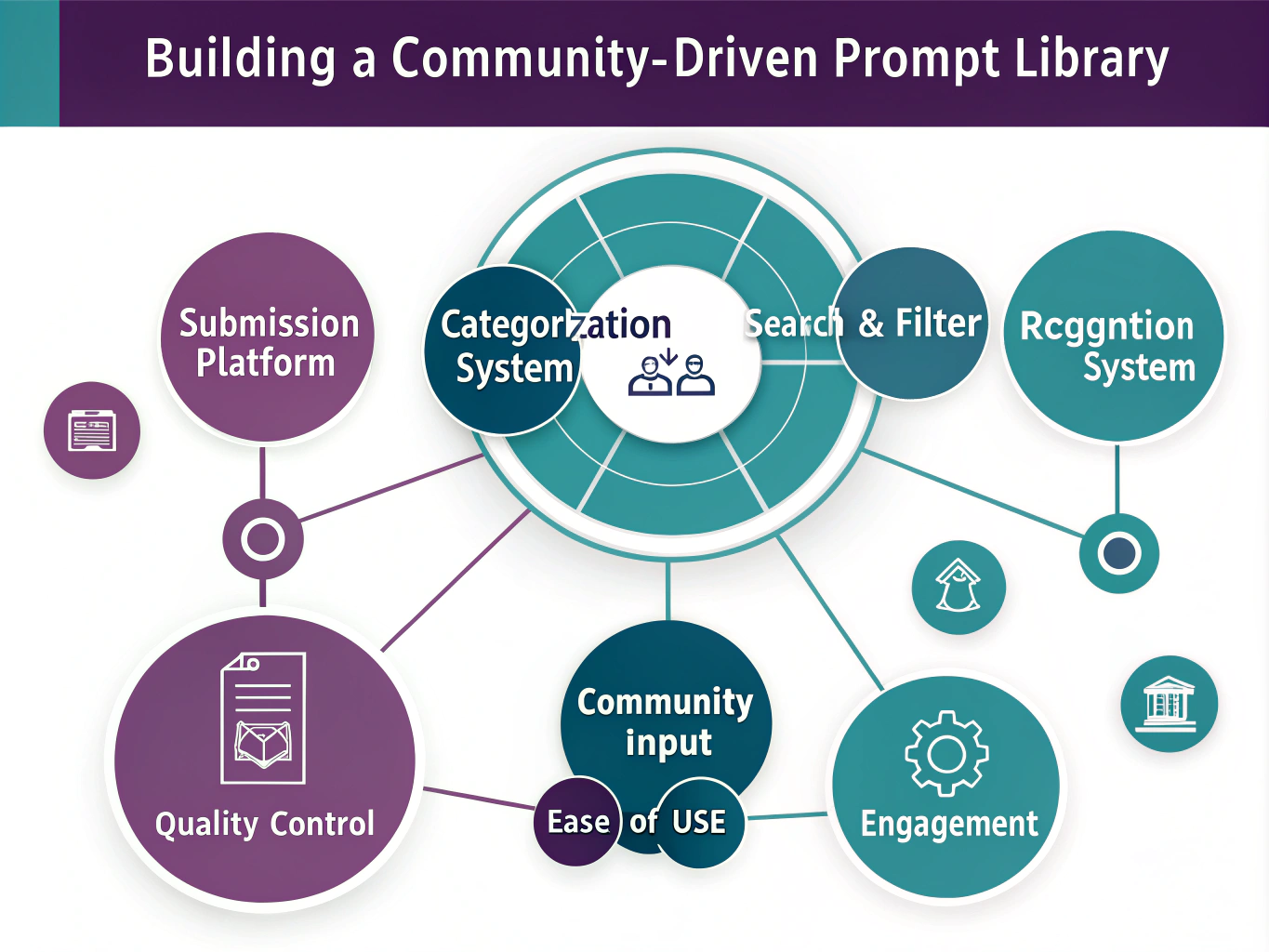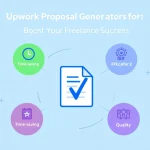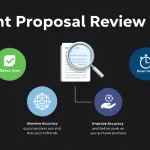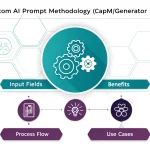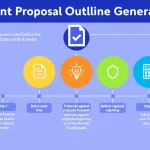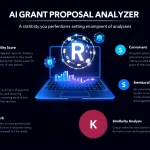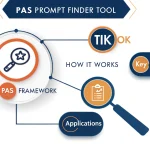Is this tool helpful?
How to Use the Community-Driven Prompt Library Proposal Generator Effectively
To make the most of this powerful tool for creating a comprehensive proposal for a community-driven prompt library system, follow these steps:
- Describe the Submission Platform: In the first field, outline the platform where users can submit their prompts. Consider aspects such as user interface, accessibility features, and submission guidelines. For example, you might describe “A mobile-responsive web application with a clean, intuitive interface that includes user authentication via email or social media accounts, and a prominently displayed set of submission guidelines to ensure quality contributions.”
- Explain the Categorization System: Detail how prompts will be categorized in the second field. Include information about the main categories (industry, framework, topic) and any subcategories. For instance, you could propose “A multi-tiered tagging system that allows for primary categories (industry, framework, topic) and secondary tags for more specific classifications, with the ability for users to suggest new tags subject to moderator approval.”
- Describe Sorting and Filtering Mechanisms: In the third field, explain how users can sort and filter prompts based on the outlined categories. Consider user experience and ease of navigation. An example could be “An advanced search functionality with autocomplete suggestions, multiple filter options (e.g., date range, popularity, user rating), and the ability to save custom search preferences for quick access in future sessions.”
- Suggest Recognition and Incentives: Propose methods to recognize top contributors in the fourth field. Think about both intrinsic and extrinsic motivators. For example, “A gamified point system where users earn badges for quality submissions, coupled with a monthly showcase of top contributors on the platform’s homepage and featured interviews in a community newsletter.”
- Describe Community Input Strategies (Optional): In the final field, outline strategies for encouraging and managing community input effectively. Consider both engagement and quality control aspects. You might suggest “Regular themed prompt creation challenges with prizes, a peer review system where experienced users can provide feedback on new submissions, and community voting on prompt effectiveness to surface the most valuable content.”
After filling in all required fields (and the optional field if desired), click the “Generate Proposal” button to create a comprehensive proposal based on your inputs.
Revolutionizing Prompt Libraries: The Power of Community-Driven Systems
In the rapidly evolving landscape of artificial intelligence and machine learning, prompt engineering has emerged as a crucial skill. The Community-Driven Prompt Library Proposal Generator is a cutting-edge tool designed to help organizations and communities create robust, scalable systems for crowdsourcing and expanding online prompt libraries. By harnessing the collective intelligence of users, this tool facilitates the creation of diverse, high-quality prompt collections that can drive innovation across various industries and domains.
Understanding the Importance of Community-Driven Prompt Libraries
Prompt libraries serve as invaluable resources for developers, researchers, and AI enthusiasts working with language models and other AI systems. However, creating and maintaining a comprehensive prompt library can be a daunting task for any single entity. This is where the power of community-driven systems comes into play.
A community-driven approach to prompt library development offers several key advantages:
- Diversity of perspectives and expertise
- Rapid expansion and iteration of prompt collections
- Continuous refinement and quality improvement through user feedback
- Increased relevance to real-world applications across various industries
- Foster innovation and knowledge sharing within the AI community
The Role of the Proposal Generator
The Community-Driven Prompt Library Proposal Generator serves as a catalyst for organizations and communities looking to establish or enhance their prompt library systems. By guiding users through key considerations such as submission platforms, categorization systems, and user incentives, this tool helps create comprehensive proposals that address all aspects of a successful community-driven prompt library.
Benefits of Using the Community-Driven Prompt Library Proposal Generator
1. Comprehensive Framework Development
The proposal generator ensures that all critical components of a community-driven prompt library system are addressed. By prompting users to consider aspects such as submission platforms, categorization systems, and user incentives, it helps create a holistic framework that sets the foundation for a successful and sustainable prompt library.
2. Time and Resource Efficiency
Developing a proposal for a complex system like a community-driven prompt library can be time-consuming and resource-intensive. This tool streamlines the process by providing a structured approach, allowing organizations to quickly generate comprehensive proposals without extensive research or brainstorming sessions.
3. Customization and Flexibility
While the tool provides a structured framework, it also allows for customization to fit specific organizational needs. Users can tailor their proposals to align with their unique goals, industry focus, and community characteristics.
4. Stakeholder Alignment
The detailed proposals generated by this tool can serve as effective communication tools for aligning stakeholders. By clearly outlining all aspects of the proposed system, it facilitates discussions and decision-making processes within organizations.
5. Scalability Considerations
The proposal generator encourages users to think about scalability from the outset. By addressing aspects such as categorization systems and sorting mechanisms, it helps create proposals for systems that can grow and evolve with the community’s needs.
Addressing User Needs and Solving Specific Problems
Challenge: Organizing Diverse Prompts
One of the primary challenges in managing a prompt library is effectively organizing a diverse range of prompts. The proposal generator addresses this by guiding users to develop comprehensive categorization systems.
For example, a user might propose a three-tiered categorization system:
- Primary Categories: Industry, Framework, Topic
- Secondary Tags: More specific classifications within each primary category
- User-Generated Tags: Allowing community members to suggest new tags, subject to moderation
This system would allow for prompts to be easily categorized and retrieved, solving the problem of information overload and improving user experience.
Challenge: Ensuring Quality Contributions
Maintaining the quality of submissions in a community-driven system can be challenging. The proposal generator addresses this by encouraging users to consider both submission guidelines and recognition systems.
A sample solution generated by the tool might include:
- Clear submission guidelines prominently displayed on the platform
- A peer review system where experienced users can provide feedback on new submissions
- A point-based system that rewards high-quality contributions
- Regular featured spotlights for top contributors, incentivizing quality over quantity
This multi-faceted approach helps ensure that the prompt library maintains a high standard of quality even as it grows.
Challenge: Fostering Community Engagement
Keeping users engaged and motivated to contribute is crucial for the success of a community-driven system. The proposal generator addresses this by prompting users to consider recognition and incentive systems, as well as strategies for encouraging community input.
A proposal might include engagement strategies such as:
- Monthly themed prompt creation challenges with prizes
- A gamified badge system for different types of contributions
- Community voting on prompt effectiveness
- Regular community events, such as virtual meetups or webinars featuring top contributors
These strategies help create a vibrant, active community around the prompt library, ensuring its continued growth and relevance.
Practical Applications and Use Cases
Use Case 1: AI Research Institution
An AI research institution could use the proposal generator to create a system for collaboratively developing and sharing prompts for various language models. The proposal might include:
- A submission platform integrated with the institution’s existing research management system
- A categorization system based on research areas, model architectures, and task types
- A peer review process for ensuring the scientific validity of submitted prompts
- Recognition of top contributors through featured publications and conference presentations
This system would facilitate knowledge sharing among researchers, accelerate experimentation, and potentially lead to breakthroughs in AI capabilities.
Use Case 2: EdTech Company
An educational technology company could use the tool to propose a prompt library system for generating diverse, age-appropriate learning content. The proposal might include:
- A user-friendly submission platform accessible to educators worldwide
- A categorization system based on subject areas, grade levels, and learning objectives
- An AI-assisted quality check system to ensure age-appropriateness and educational value
- A point system that rewards educators for creating prompts that lead to engaging, effective learning content
This system would enable the company to rapidly expand its content offerings, tailoring them to diverse educational needs across different regions and curricula.
Use Case 3: Marketing Agency Network
A network of marketing agencies could use the proposal generator to create a shared prompt library for generating creative marketing ideas. The proposal might include:
- A secure, branded submission platform accessible only to member agencies
- A categorization system based on marketing channels, target demographics, and campaign objectives
- A collaborative feature allowing agencies to build upon and refine each other’s prompts
- A recognition system that highlights agencies whose prompts lead to successful campaigns
This system would foster collaboration and innovation across the network, leading to more creative and effective marketing campaigns for clients.
Frequently Asked Questions (FAQ)
1. What is a community-driven prompt library?
A community-driven prompt library is a collaborative platform where users can submit, categorize, and access prompts for various AI applications. It leverages the collective knowledge and creativity of a community to create a diverse and continuously expanding resource.
2. How does the proposal generator help in creating a community-driven prompt library?
The proposal generator guides users through key considerations such as submission platforms, categorization systems, and user incentives. It helps create comprehensive proposals that address all aspects of a successful community-driven prompt library system.
3. Can the proposal generator be used for different types of organizations?
Yes, the proposal generator is flexible and can be used by various organizations, including research institutions, educational companies, marketing agencies, and more. Users can tailor their inputs to align with their specific organizational needs and goals.
4. How does the categorization system work in a community-driven prompt library?
The categorization system typically involves multiple levels, such as primary categories (e.g., industry, framework, topic) and secondary tags for more specific classifications. Some systems also allow for user-generated tags, subject to moderation.
5. What are some effective ways to encourage community participation?
Effective strategies include implementing gamification elements (like point systems and badges), organizing regular challenges or competitions, featuring top contributors, and providing tangible rewards for high-quality submissions.
6. How can quality be maintained in a community-driven system?
Quality can be maintained through clear submission guidelines, peer review systems, moderator oversight, and recognition systems that reward high-quality contributions. Some systems also implement AI-assisted quality checks.
7. Can the proposal generator help with scalability considerations?
Yes, the proposal generator encourages users to think about scalability by addressing aspects such as robust categorization systems and efficient sorting mechanisms. This helps create proposals for systems that can grow and evolve with the community’s needs.
8. How can a community-driven prompt library benefit AI development?
A community-driven prompt library can accelerate AI development by providing a diverse range of high-quality prompts, fostering innovation, facilitating knowledge sharing, and allowing for rapid iteration and refinement of prompts based on real-world applications.
9. Is it possible to implement access controls in a community-driven prompt library?
Yes, access controls can be implemented to suit different needs. For example, a system might be fully public, restricted to registered users, or limited to members of a specific organization or network.
10. How can the effectiveness of prompts be evaluated in a community-driven system?
Prompt effectiveness can be evaluated through various means, including user ratings, usage statistics, peer reviews, and in some cases, automated testing against predefined benchmarks. Community voting on prompt effectiveness is also a common feature in many systems.
Important Disclaimer
The calculations, results, and content provided by our tools are not guaranteed to be accurate, complete, or reliable. Users are responsible for verifying and interpreting the results. Our content and tools may contain errors, biases, or inconsistencies. We reserve the right to save inputs and outputs from our tools for the purposes of error debugging, bias identification, and performance improvement. External companies providing AI models used in our tools may also save and process data in accordance with their own policies. By using our tools, you consent to this data collection and processing. We reserve the right to limit the usage of our tools based on current usability factors. By using our tools, you acknowledge that you have read, understood, and agreed to this disclaimer. You accept the inherent risks and limitations associated with the use of our tools and services.
